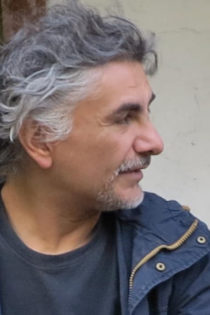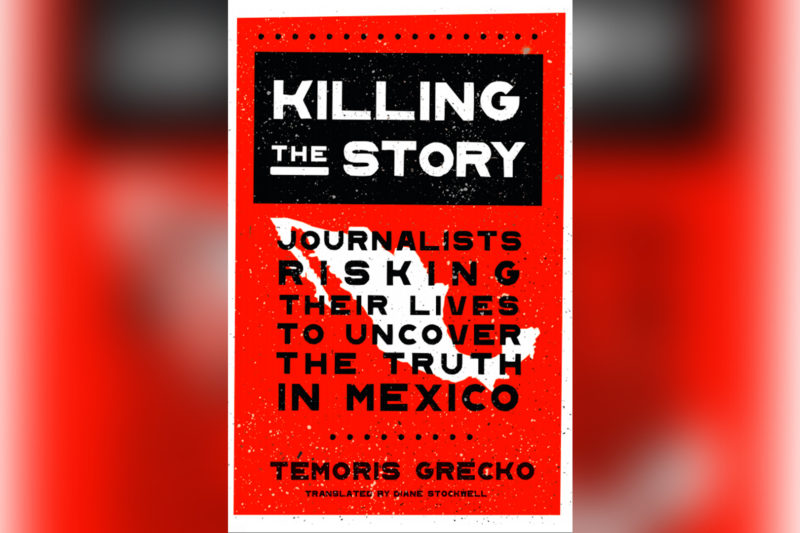Mexican Writer Témoris Grecko on Journalists Risking Their Lives
By Sumaiya Malik
Reporting Texas
In 2014, 43 college students were kidnapped in the Mexican state of Guerrero. They were on their way to Mexico City when police intercepted them and forced them into police trucks. The students were never seen again.
Mexican journalist Témoris Grecko had recently returned home after years of covering conflicts and enduring kidnapping as a war correspondent in the Middle East. The grim situation in Mexico made him realize the extent to which government corruption plagued his home country. He started investigating. In 2014, Grecko, along with a group of journalists, writers, photographers and filmmakers, formed Ojos De Perro vs la Impunidad, a media collective to expose corruption. What followed was a series of documentaries, three books and, finally, “Killing the Story: Journalists Risking Their Lives to Uncover the Truth in Mexico,” published in the United States in June.

Témoris Grecko. Courtesy Ojos De Perro vs la Impunidad
Grecko will speak at the Texas Book Festival at 12:45 p.m. on Nov. 8 on Zoom. The book festival, which is virtual this year, runs from Nov. 6 to 15.
“Killing the Story,” a hair-raising account of the plight of independent journalists in Mexico, highlights four of those murdered for exposing corruption during the tenure of Javier Duarté, ex-governor of Veracruz (2010-2016). The Guardian reported in September 2018 that during Duarte’s administration, Veracruz became one of Mexico’s most dangerous, most censored and most indebted states. According to the LA Times, Duarte “struck a deal with prosecutors,” and pleaded guilty to money laundering and organized crime. In May 2018, a federal tribunal confirmed Duarte’s 9-year prison sentence.
In a conversation with Reporting Texas, Grecko shared his war experiences and told the stories of journalists who have been killed in their search for the truth. Herewith excerpts, edited for clarity:
You covered El Salvador and the conflicts in the Middle East as a war correspondent. Why?
I felt attracted by how people are put to strange and very tough situations and how they overcome social and political conflict. Also, people think that the story of conflict is that of people who are killing others. They don’t see the stories of those who are saving others.
During your time in the Middle East you were kidnapped. Who kidnapped you?
In January 2013, two of my colleagues and I were working together in Aleppo, Syria. There was a very young French girl, she joined us. We believe al-Qaida affiliates were angry with the French. They knew that there was a French person; they did not know she was a girl, just there was a French person working with our group. So they came after us, but we were so lucky that day this French girl didn’t come up with us. I think she was annoyed with us. So yeah, she was lucky that she didn’t come. When they realized that they didn’t have the French person they wanted they had to choose between releasing us or killing us. Of course, they took everything they could from us, you know, money, cameras, passports, everything, even our shoes, but they let us go. We were incredibly lucky.
Tell us about the murder of social activist and journalist Moises Sanchez in Veracruz in 2015.
Sanchez used to live in a small municipality of Medellín de Bravo, facing a lot of trouble, where he was the only voice. He refused to be bought. They resorted to murder him when he was asleep in his home. His grandchildren were playing outside. Nine men came in breaking everything and took him away. And four weeks later, his body was found dismembered.
Jorge Sanchez, Moises’ son, believes that the order came from the state governor, but it was probably executed by the mayor. The mayor, the only link between the crime and the governor, has been missing for the past six years.
Moises’ son, a graphic designer by profession, is now a journalist and is the embodiment of his father’s philosophy. He runs a paper called “La Union Veracruz.” This shows that you can’t kill the truth by killing a journalist because other journalists will come in and you will attract attention that will put you in trouble.
In the book you mention journalist Pedro Canché and how he was unjustly imprisoned by Javier Duarte, then-governor of Veracruz. What happened next?
Pedro Canché, a Mayan reporter from Quintana Roo, covered a protest over water prices. This angered Duarté. Canché spent nine months in jail until his case attracted national attention and he almost got killed in prison. Amnesty International and Article 19, a British-based human rights organization, managed to free him. A couple of years later, Duarté was in prison in Panama accused of massive fraud. The situation got reversed. Canché went to the prison to interview him. When Duarté saw Canché, he asked the guards to take him, but the guards said that you’re not the governor anymore. You’re not even in Mexico, you’re in jail. And you have to see this person.
How is the situation in Mexico now?
So far, the fate of journalists is just the same as it was before Andrés Manuel López Obrador [popularly known as AMLO] came to power in 2018. AMLO likes to engage in controversy with the media. He likes to talk back to what columnists say or what the newspaper says.
Do you see any similarity between U.S. President Donald Trump and AMLO?
Trump declares that the media is the enemy of the people. And every time he speaks to them, he has an insult, “failed New York Times,” and “crooks.” AMLO engages in controversy. His insult is calling the media conservatives. He believes in freedom of speech. And I think that the attitude is quite different. AMLO is not arrogant.
Compare police brutality in Mexico and the U.S. With all your conflict experience, how do you think this can be overcome?
When President Trump wanted to dispel Black Lives Matter protests outside of the White House, walk to the church, hold the Bible and threaten to use the military, everybody jumped! In the U.S., people say you can’t use the military for this. In Mexico, since 2007, the military has been doing public security jobs. And this has led to a lot of human rights abuses, because the armed forces are not trained for this for controlling civilian society. What do you have in the U.S. in the police, trained to distrust any person around, to use any measure of force, to neutralize them, especially when they see people from minorities from Black or Latino or other minorities? The police in the U.S. look pretty much like an occupying army.
Your book offers extensive details about corruption of police entangled in the Mexican narco-war. How would you reform the police?
First of all, is philosophy reform and how the police are trained. It is not only about the weapons, it’s about how you use the weapons. The police are afraid, because some citizens might use their weapons against them. This is a nation that believes that carrying around weapons is a fundamental right of every citizen. I believe that the people should not be armed. And that will be most helpful for keeping peace and also for keeping police quiet. If the police are not afraid that the citizens will be armed and they will shoot at them, then there is no reason to sustain this philosophy of using lethal force to neutralize threats.
How has AMLO’s immigration policy helped the U.S.?
At the beginning of his presidency, AMLO legalized Central American migrants in Mexico. He also understood that they were a political problem for the country, because these migrants would use Mexico as a platform to migrate to the United States. Trump’s economic threats forced AMLO to change his immigration policy toward Central American migrants. We are a country of 130 million people. If we have a few thousand Central American migrants every year, I think we can integrate them. But that’s because we have Trump on the other side of the border.
Most of them are people just looking for a better way of life. and are trying to give something to a society that will accept them and not be a burden.
How are journalists managing their safety in Mexico?
I asked this journalist from Reynosa, Tamaulipas, which is also on the border with Texas. He spoke to us anonymously because he has been through beatings, through death threats. He knows that he can be kidnapped and beaten again. He is still doing his job. I asked him why. He said it makes him happy when someone tells him that his reporting changed his life for the better. Thank you.
What do you hope Texans get out of reading your book?
I wish Texans would understand that many conflicts in Mexico are not only-Mexican conflicts. They have roots and consequences across the border. Drug trafficking is the result of both consumption and prohibitions in the U.S.
Money and weapons massively flow from Texas into Mexico to fuel violence. Those are just two examples. Solutions need to be shared by those who are divided by a mere river.
Audio produced by Sumaiya Malik. Audio editing by Dominique LaVigne and Harrison Young.
